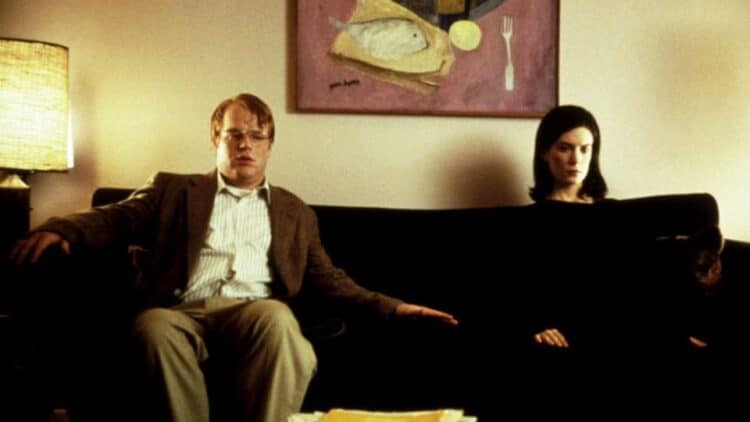
When it comes to revisiting underrated cult films from the past, it is always important to try and get viewers to view or revisit Todd Solondz’s Happiness (1998). That is easier suggested than done since this is one wild, disturbing, and creepy film, yet also not without a dose of wicked dark humor. Like many of the filmmaker’s fans, I first became exposed to Solondz when I watched Welcome to the Dollhouse on VHS in the mid-1990s. At the time, I was around Dawn’s age in that film, and being a nerd in high school made watching her incisive and brutally honest, and painful experiences quite cathartic. Two years after his indie success with that film, Solondz wrote and directed another indie film that used a Robert Altman-esque vignette storytelling style to explore the lives of a dysfunctional, middle-class American family–very dysfunctional. The end result was Happiness. This is a movie that has unfortunately been lost over time; it is not streaming anywhere, likely because of its dark content in this hyper socially aware culture we live in today, but it can be tracked down on DVD for those interested. Why is it worth seeing? Let’s take a closer look at why this is an important film.
What Is the Film About?
Happiness tells a somewhat basic sprawling story as it explores the public and private lives of the Jordan family, specifically its three sisters and their spouses, work associates, and also their parents. It’s not so much what happens as far as the plot is concerned, but the narrative of the film is more concerned with the particular experiences of pain and pathos of the entire family as one scene cuts to the next. The movie is incredibly dark at times, but there is a strong strain of dark humor present as well. When discussed and analyzed, Happiness is often compared with the movies of David Lynch, and I can readily see why this is because both Lynch and Solondz take a more realistic look at the traditional slice-of-life story in their films, but they are miles away apart as far as tone and content. Michael Newman writes, “Happiness peels back the façade of complacent suburban life to reveal the anguish beneath the appealing surface.” There are many films now that do this very well, but I think a more apt comparison for Happiness could be found in something like David Lynch’s Blue Velvet. Solondz’s film explores everything from a sales associate (Philip Seymour Hoffman) obsessed with prank calling women and masturbating while talking dirty to them to a psychiatrist who works hard to suppress his sexual attraction to pre-pubescent young boys and is also the husband of one of the Jordan sisters, to a neighbor (Camryn Manheim) of the prank caller who falls for him but not before letting us see that previously she snapped the neck of a concierge who helped her take groceries into her apartment and then proceeded to kiss and grope her—she chops up his body and hides it in her deep freezer.
This Film Is Dark…Very Dark
What is brilliant about the film is how Solondz never judges or seeks to condemn the unsavory activities of his characters–even the pedophile. There is one scene in the film that baffles the mind upon first viewing but is a testament to the bold and courageous spirit of Solondz’s indie filmmaking. The husband of Trish is a doctor of mental health and the couple has one young son around the age of 13. Early on in the film, we see him drive home from work and stop in a supermarket to buy a teen magazine aimed at young girls that are filled with images of popular teen actors (think Tiger Beat, Bop). He brings the magazine to his car and masturbates to the pictures of the young boys in his backseat. Later in the film, the doctor becomes obsessed with his son’s fellow little league teammate, and he proceeds to drug his wife and son one night during a sleepover to become alone with the young boy. He drugs him as well and has sex with his unconscious body.
Art has a particular way of allowing us to see all the vagaries that exist in our world, both light and dark. Solondz achieves something with this scene that is so profoundly disturbing and stark in its realism that we cannot look away from it and cannot believe what we just saw in a fiction, scripted film. The viewer is repulsed and had Solondz left the story of the pederast doctor right then and there, it would be incredibly problematic. But there is a scene between the doctor and his son towards the end of the film that is heartbreaking. The doctor has been found out and his entire world is about to be changed forever—as well as that of his family. His son asks him why he does what he does, and the doctor doesn’t resort to condemnation talking points, he lays it all out in graphic detail and even admits that he has masturbated thinking of his son before.
The doctor tells these truths with tears streaming down his face and never looking away from his son. Solondz is telling us a blunt truth here in that however repulsive and disturbing the actions of a pedophile are, they are living, breathing human beings—some of them quite successful, that happen to be afflicted with incredibly disordered thinking, and if they act on these feelings, as the doctor tries hard to suppress for so long, they have to be removed completely from social structures due to the trauma they inflict on the most innocent. Rather characters wish to kill them, imprison them, or taunt them from afar, these are real people, just like the phone prankster who gets off by saying perverse things to anonymous women, the status-obsessed suburbanites who live in superficiality, the youngest child who moves from cause to cause because she lacks an identity she can feel comfortable with, the patriarch of the family who continues to oversalt his food even after a doctor gave him a health scare–these are people, warts and all, just trying to find something in this world that leads to the title of the film. J.P Telotte writes, “thanks to mass media, films today rarely stand alone due to intervening mass media.” I think a film like Happiness still manages to do just that, but this never would have been possible if it weren’t for the freedoms allowed in independent filmmaking. It is not an easy watch, But Happiness is certainly worth seeing for those who keep an open mind.
 Follow Us
Follow Us





